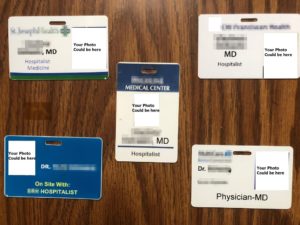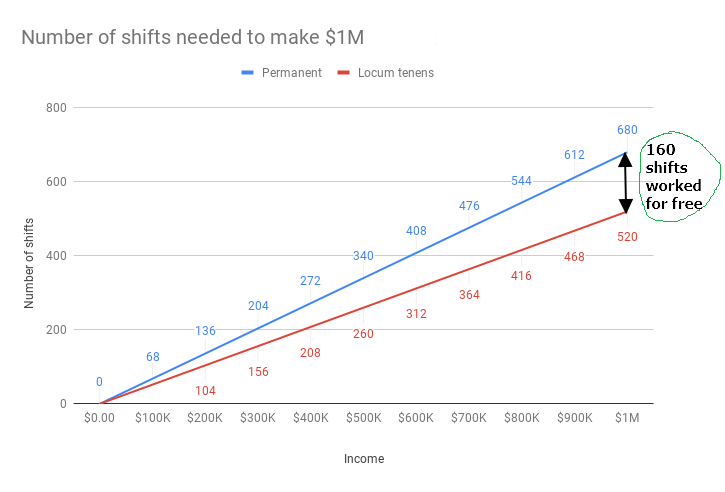

Vlad Dzhashi, MD
FREE REPORT: Locum Hospitalist Pay by Region
Lots of people ask me why I am doing what I’m doing. I mean, why don’t I get a “regular” hospitalist job?
Is locum tenens really that good? Or is it just because I have a short attention span or a personality problem of some sort?
The short answer is: lifestyle!
My hospitalist lifestyle underwent a big transformation over the years as I transitioned from being a resident to a full-time employee to the locum guy.
Today, I’ll show you exactly why I made this transition, and then I’ll compare two lifestyles: permanent hospitalist and locum hospitalist.
I have to warn you, I am super biased and favor locum tenens 100%.
Having said that, if you find any outrageous lies here or you disagree with something, feel free to throw “rotten tomatoes” at me in the comments section.
Without further ado, let’s look at the “pillars” of the hospitalist lifestyle:
- Schedule
- Money
- Spare time
- Burn out
- Career path
Hospitalist lifestyle: key pillars
Without further ado, let’s look at the “pillars” of the hospitalist lifestyle:
- Schedule
- Money
- Spare time
- Burn out
- Career path
Hospitalist schedule
Permanent job:
As a full-time hospitalist, you’ve got your typical 7-on/7-off schedule and its variations, e.g. 5 on/5 off or 10 on/10 off. On average, hospitalist jobs offer 11 days a year of PTO time on top of that; although, more than 50% of hospitalists do not get any PTO at all.
So we are looking at 170 shifts a year. At first glance, it looks like you work less than half a year.
Doesn’t sound like much work, does it?
When I started my first hospitalist job after residency, it felt like a dream job to me. I was truly enjoying a hospitalist lifestyle.
Of course!!!
For somebody used to working 80 hours every week during the residency, switching to 80 hours every other week was a great deal!
The best thing about the permanent hospitalist schedule is that it’s predictable: you know you are there for 7 days and then again for 7 days after a one-week break.
However, there are problems with this “fixed” schedule:
1 – Sooner or later your shifts will fall on holidays, weekends and other days that you really need to be off (e.g. kid’s birthday, anniversary, other important events that you want to attend, etc.)
2 – You will have to rotate through nights and swing shifts (everybody has to take a turn kind of a thing). It makes a hospitalist lifestyle messy, especially if you cannot stand the nights, like me.
3 – Your vacation time (the majority of hospitalists DO NOT have any PTO time) is at your administration’s mercy. The typical rule is to apply early or else you are stuck. The problem I found was that most of my peers wanted to take time off around the same times I did in winter and summer.
4 – You only get 7 days off in a row. But what if you want to be off for a couple of weeks or a month or two? The good old, “Let’s swap some shifts” doesn’t always work well, as you probably know.
Now, there are programs that are trying to create a very flexible schedule, and some even offer a few weeks of PTO. Unfortunately, they tend to pay less and you still won’t have much control over your schedule.
Locum tenens:
Here, your schedule is determined by you.
There are lots of possible options: you can find locum gigs with a 7-on/7-off schedule or you can create a M-Th or M-F schedule, as I’ve seen hospitalists with school-age kids do.
The way I’ve created my schedule this year is I’ve decided to work around 160 shifts. (My thought was it would give me a good income and leave plenty of time off.) Then, I distributed them throughout the year around the school break time. It looks like this:

As you see, my spring and fall months are busiest for me: I work 20 shifts a month. But I am COMPLETELY off two summer months a year, and I make up for it by working longer stretches for a few months.
What changed in my schedule and lifestyle compared to my previous 7-on/7-off job?
1 – I travel for a full 2 months every summer with my family without asking anybody’s permission.
2 – I’ve got a very “light” schedule during Jan and Feb. This way, I stay away from the flu season months, since they are always FREAKING BUSY.
3 – I don’t work any night shifts since I typically need lots of time to recover after them.
The beauty of the locum tenens is that my schedule is completely customized to my needs and plans.
Now, I have to admit, it doesn’t always work the way I plan. A couple of times my shifts were canceled on short notice and I had to scramble for work at a different hospital.
I also once had no work for 8 weeks in a row, which didn’t bother me much because of the “safety net” I got, including my locum tenens health insurance. I ended up making up for those by adding a few shifts a month throughout the rest of the year.
What I am trying to say is that my locum schedule is not perfect, but it’s always very good. That’s because I have the maximum possible control over it!
Hospitalist spare time
Now, let’s look at the time when you are off.
A full-time hospitalist job gives you very predictable time off and a good amount of it. Although you still essentially work an average of 40 hours a week (84 hours every other week), it sure feels good when you are off.
However, you are limited in what you can do with your spare time because you’ve got only 7 days off.
Is this enough time off?
Actually…NO!!!
You see, the life was not created for people working 7 on/7 off. Let me explain.
Personally, I am convinced we all need to free up some time every year to learn something new or experience the things we’ve always dreamed about.
In fact, I’ve made it my rule and have followed it for a few years now. Every time it gives me a new perspective and mental energy boost for months to come.
For example, a couple of years ago, I did a month-long point-of-care ultrasound training at the University of California Irvine.
Let me tell you, I had a blast!
I learned so much in just a few weeks!
The great thing is that I was off for a month in Irvine, CA, for my training, went back to work for several weeks and then traveled for another month and a half with my family.
All of this would’ve been impossible if I had a 7-on/7-off schedule.
Let’s look at learning Spanish, for example, which is another important skill in “my bucket list.”
Wouldn’t it be nice to speak Spanish so that you could communicate with your patients without needing an interpreter?
Of course!!!
Now, with the flexibility of locum, you could take a couple of months off (or even more than that) as a traveling doctor and go to Spain or Latin America, plunge into the culture and language, and I bet you would learn it really fast!
Could you master Spanish as fast when you work a full-time, permanent job?
Not really!
Believe me, I’ve tried to learn a foreign language before: you schedule few lessons a week with a tutor, read and listen to some podcasts, but your progress is painfully slow. Shortly after you’ve started, you feel stuck and give up.
These are just examples of the experiences and skills you can jumpstart when you’re privileged to have a flexible schedule.
Since I’ve switched to locum tenens, I’ve had so many more options for what to do with my spare time. I’m convinced my life became much richer with those experiences.
Travel:
What if you want to take a really exciting trip?
If you are considering any “serious” or long-term travel, locum is the way to go.
With the 7-on/7-off schedule, you can make some local trips in your week off. But anytime you change more than a few time zones, you need a long time to recover and 7 days off is clearly not enough.
What if you need to visit your relatives abroad?
I know a lot of hospitalists whose families live abroad, and they travel to visit them every year. In fact, some chose locum tenens just to be able to visit for a month or two at a time.
The ugly side of locum tenens time off:
Enough about good stuff! Let’s talk about the “annoying part” of being a locum hospitalist.
One thing that is different from any permanent job:
YOU HAVE TO HUSTLE!
What do I mean by that?
1 – I always need to make sure I’ve got enough shifts scheduled for at least 4-5 months ahead. So I am on the lookout for new locum or per-diem gigs and probing my current hospitals to see how long they would need my services.
2 – I have to get credentialed at new hospitals as well as get new state locum tenens licenses, so I fill out lots of paperwork.
3 – When I work out of state, I spend at least 6-8 hours just to get to and from the hospital location. This could be much worse if I ever decide to fly coast to coast or want to do a long drive to the neighboring state.

Doesn’t sound very exciting, does it?
Now, listen, I still think locum is totally worth it! You have to hustle, but you gain so much freedom. It’s just the price you pay for that freedom.
Plus, I’ve learned to be efficient and found very helpful resources. So at this point, I probably spend no more than a couple of hours a month on the “housekeeping” issues.

- Jumpstart your Locums Career!
- Sign up for my coaching to access:
- Top Gigs
- Top Pay
- Unique resources
- No stress
- Jumpstart your Locums Career!
- Sign up for my coaching to access:

- Top Gigs
- Top Pay
- Unique resources
- No stress
Hospitalist income
Everybody would agree that money is important for your lifestyle. It may not be as much about what you can buy with it, but more about how much freedom you have.
Now, I’ve written in detail about the locum tenens hospitalist salary. I’ve also created this locum tenens salary calculator to help you calculate your salary.
If you want to know how much locum hospitalists get paid in different regions, check out the special report I’ve created. Click Here to download it.
Simply put, as a locum tenens hospitalist, you get much higher hourly pay, which makes it a better use of your time.
To prove this, let’s take a look at the permanent and locum income more closely using a timeline.
The “regular hospitalist,” aka “Mr. 7 on/7 off,” makes a mean hourly pay rate of $123/hr and the average “locum Joe” makes $160/hr.
Let’s see how long it will take both of them to make $1M:
So it will take 160 shifts less for the “locum Joe” to make his $1M.
Congratulation “Mr. 7 on/7 off”! You’ve worked a whole year for free to get the same results.
Roughly speaking, every 3 years of locum income equal 4 years of the full-time hospitalist salary.
Do you like working for free?
I sure don’t!
Another amazing thing about locum tenens is that you can easily switch to a higher paying gig anytime. With the permanent job, once you’ve signed the contract, you get what you get.
The point is that none of the top full-time hospitalist salaries can beat the locum tenens income.
You might say, “That’s nice, but I don’t want to make more money. The average hospitalist salary will do.”
No problem!
You can work less and still have a great income.
How about only 9 shifts a month?
Exactly!
Here’s how to do it:
Simply pick a locum gig in a state with zero or low income tax, negotiate like a pro, and get your 50% $/hr more.
This way you can work 30-40% less time. So instead of 170 shifts a year, you will only need to work 110 shifts a year, or 9 shifts a month.
Onward
Are hospitalists happy? Beware the burnout
The burnout sneaks up on you when you’ve got too much long-term stress at work, and it starts affecting your functioning at the mental and physical levels.
The truth is that you can burn out as a hospitalist pretty easily if you ignore the stressors. If it happens, it’s important to take a step back and try to understand what makes you unhappy at work.

Can you burn out working locum tenens?
Yes, absolutely!
I experienced it myself when I worked too much for too long at a hospital with a very toxic culture. When I realized what happened, I canceled my shifts for the whole month and rearranged my schedule to work only at the hospitals where I enjoyed working.
Now, could I have done that so easily if I was a full-time hospitalist?
Not really!
Last time I checked, hospitalists don’t get a standard “burnout” leave unless it’s time for your vacation.
With locum tenens, you simply have so much more control of where and when to work that you can avoid the burnout in the first place and address it right away if it ever rears its ugly head.
Hospitalist career
The biggest advantage of being a permanent hospitalist is that you can easily transition to an administration role: e.g., hospitalist director, CMO, quality and safety etc.
On the other hand, if you see your career path outside of hospital medicine or medicine in general, locum is better.
The flexibility of the locum tenens schedule lets you explore and experience new things. Who knows, you may create an actual career out of it.
Your hospitalist career path may have no path at all — you are a locum hospitalist and then you retire.
If you are interested in the early retirement and financial independence, locum can be a shortcut.
After all, your schedule could be 15 years on/45 years off.
Locum bonus: no meetings or committees.
Who likes the hospitalist team meetings, raise your hand!
The truth is….NOBODY!
I always felt they were the biggest time wasters. You know, a dozen or more hospitalists gathered in the room, talking about all the grown-up stuff — productivity, billing, he said/she said BS.
The best part of the meetings was when actual patient care and workflow were discussed. However, I always felt that you could get away with a simple email or two instead of a super formal gathering.
Now, the reason I mention this is that….it’s completely missing in the locum tenens world. For good.
Locum lets you out of the seemingly endless array of meetings and hospital committees.
And that’s great! I’ve got better things to do with my life.
The best hospitalist lifestyle:
Hospital medicine is a great specialty for a balanced lifestyle.
Locum tenens, however, allows you to crystallize it.
Since I switched to the locum tenens, I’ve gotten to design my hospitalist lifestyle the way I want: I work less, make more money, and never miss out on any exciting life experiences.









But you’re lacking in 401k/403b, pension (sometimes), health insurance, security, colleaguality, familiarity (which is food with coworkers, EMRs), relationships, your own “buy in” and loyalty, respect of the permanent….and probably other things.
Brooks,
As a locum hospitalist, you can get your own health insurance and retirement plan. And since the locum income is higher it makes up for not getting actual employment benefits.
As to the “relationship” and “collegiality”, I’ve mostly worked in three local hospitals in the last 2 years and know pretty much every physician in all of them.
Now, if you only work short-term locum, you may not have enough time to connect with your colleagues or make friends.
I agree that locum tenens is not for everybody and it really depends on your priorities. When I started working full-time locum, my goal was to make more money and have more flexibility at the same time and I’ve achieved that.
While locums can be great for some, I must say your statistics seem a little off. Hubby is a nocturnist (his preferred shift) works 7on/7off ten hour shifts, 22 weeks per year. Benefits galore including cme travel, insurance, retirement, etc. The hourly rate of locum doesn’t match, let alone exceed his permanent gig. The extra paperwork and “hustling” to get preferred shifts doesn’t appeal to him either. But to each his/her own and I’m glad locum is an option, and pleased to hear you find it enjoyable. Cheers!
M.C., Hi!
Thanks for your response!
I’m glad your husband got a good deal!
To be fair, you really have to compare apples to apples. Do you mind getting a little more specific and let us know what his salary or pay rate is? What region/state is he working and if he works in Metro/Suburban or rural area? Are there any procedures/ICU involved?
Thanks again!
Thanks for this detailed write up. I am starting Internal Medicine residency in July 2019. I am on the older side and don’t know if I will have the strength to pursue any fellowship, so I am starting to look at my options Hospitalist vs Locum vs Nocturnist.
We will see. Thank you
Ken, you are welcome!
You’ve got plenty of time to consider all your options.
Dear Locum Guy,
Thank you for the extensive comparison of employed vs locum tenets hospitalist.
I am starting an FM residency here in June, and have been interested in being a hospitalist. I recently read that only 5% of all hospitalists are FM trained and now I am wondering just how limited my future employment opportunities might be if I complete an FM residency then attempt to do locum hospitalist work.
Do you know if most of the hospitals that you have worked in require that you be IM trained in order to be a hospitalist?
Thank you in advance for any insight that you may provide.
Thomas, Hi!
I would say, based on my experience, 50-60% hospitals will take a FM-trained doc without any hospitalist experience, about 80% would accept FM with hospitalist experience (typically 1-2 years), and the 10-20% would only take IM-trained hospitalists.
If you want to have an access to more jobs, there’s a couple of things you could do:
1 – Get a hospitalist experience for 2 or more years at the “not-so-picky” hospital.
2 – Complete an extra year of “hospitalist fellowship”, here’s a full list of programs in the US: https://www.hospitalmedicine.org/membership/hospitalist-fellowships/. After graduating, you will be as good, if not better than IM, for a hospitalist role. Some of those programs are part of big name hospital systems, which will “boost” your CV even more.
I personally know a lot of FM-trained hospitalists and many of them worked locum tenens as well.
On the flip side, being a FM graduate, you could work as a Med/Ped Hospitalist. There’s not too many of those jobs, but obviously, you won’t have to compete with IM docs.
I hope it helps!
Hello,
I am applying to IM residency this year and would like to work locum tenens as my first job out of residency. I want to work in more rural areas with open ICU to negotiate a higher hourly rate and pay off loans quicker. Are there any specific factors in a residency program that I should look for, that will help me be well-prepared to work in these settings after residency?
Thank you
Do you find a difference in work load expectations between the locums providers and the full time hospitalists?
I.e. Do they (generally speaking) work you more than the full timers, or is it about comparable work expectations?
Jac,
I don’t think I’ve ever encountered this problem. Typically you get the same workload, census etc.
Actually, last year I was helping out with COVID surge in Tx and they gave me LESS patients than permanent hospitalists were handling. But it is more of an exception.
Hi,
It is my dream to be an oncologist surgeon, but family life and personal time are very high priorities for me. That’s why the locum life sounds very appealing to me. The only problem is, I am based in Europe (the Netherlands) and it doesnt look like that option is available here. Do you by any change know any way that it is possible to be a locum surgeon on this side?
I might offer a slightly different take on 100% locums…I have done locums for 12 years now, including 10 different states. I have 3 kids, married 24 years, and zero debt. I usually gross about $400-500k/year doing the following: (1) I find a really good hospitalist program (word of mouth, actual experience, etc) and work there part time, usually as a nocturnist so I can kayak/ski during the day. They pay usually around $160-170/hr + part time benefits (retirement) + my social security (yay!). At 6-7 shifts/month, this is a reliable and enjoyable job = 12 weeks/year = $166k/year. (2) I work locums, based on needs/desire/ability, frequently looking for 24 hr gigs (which pay up to $4k/day). Since I do all procedures + ICU, it makes me more marketable. Assume a 20-30% mark up on pay, 10-20 weeks/year at $180-190/hr = $150k – $300k/year additional. This gives me INCREDIBLE flexibility on my schedule, even allowing me to live in Costa Rica (Playa Grande!) with my family. AND- you have the “security” of a good, solid program to rely on if the locums part falls apart, doesn’t work out, gets cancelled, or you just need a break! When I tell friends that I sometimes work 12-16 weeks/year and clear around $250k, they are aghast! So, I am a HUGE advocate for 50% LOCUMS and 50% employed, with the “variable” being the LOCUMS gigs…PS- one group I worked with (Open Source MD based in North Carolina) I routinely earned $21k/week doing 16 hr days! BH